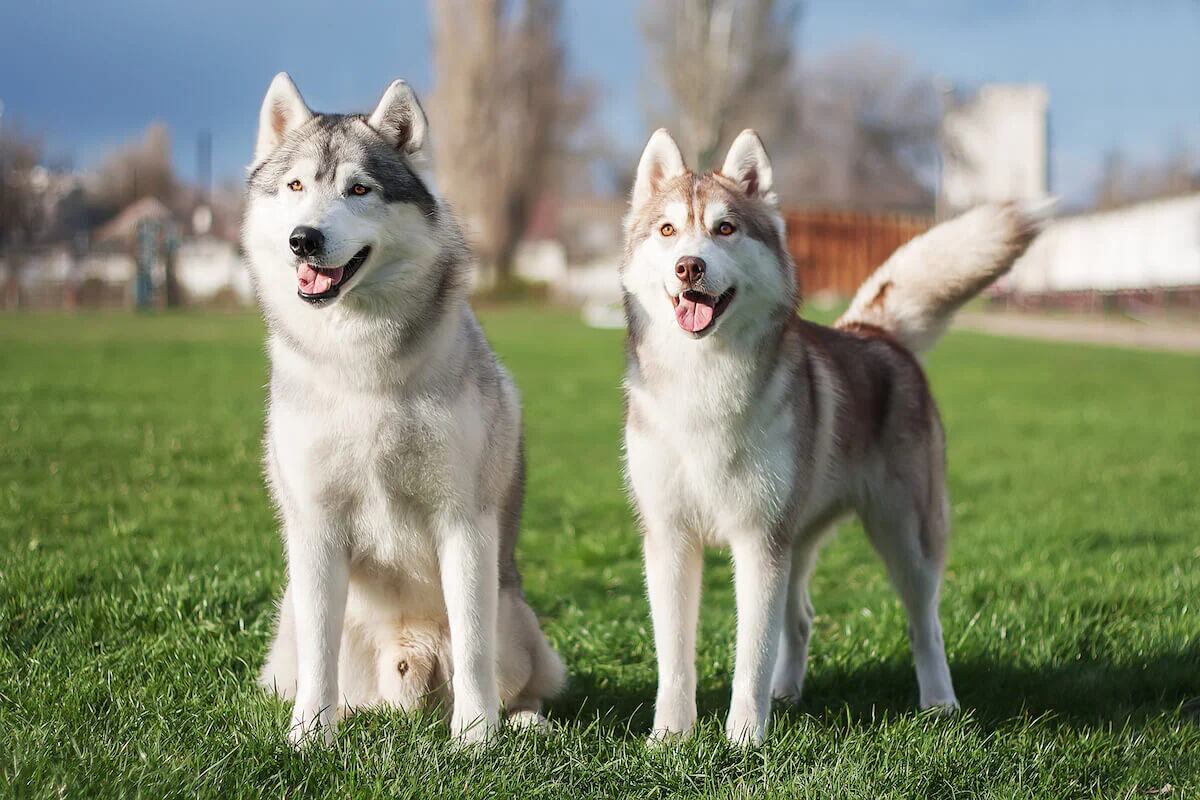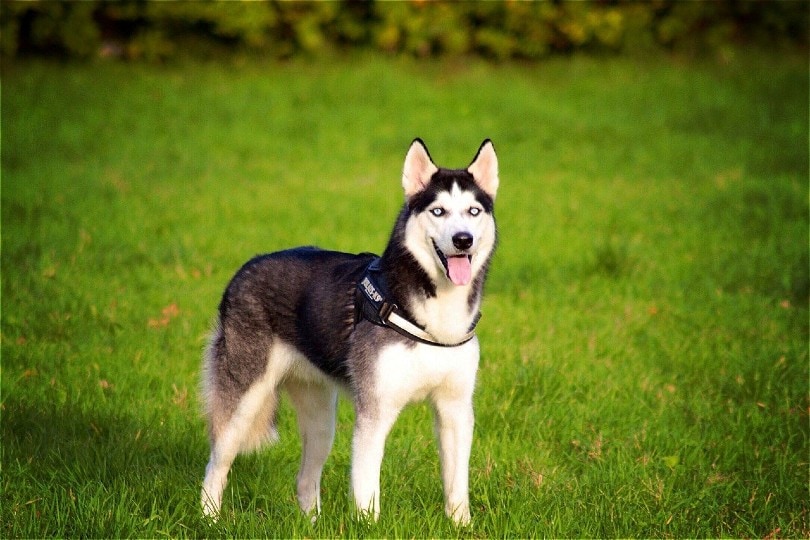Huskies typically live between 12 to 15 years. Their lifespan can be influenced by various factors.
Huskies are known for their striking appearance, high energy levels, and friendly demeanor. As a popular breed, many dog lovers are curious about their average lifespan. Understanding how long huskies live can help owners provide the best care for their furry companions.
While genetics play a significant role in determining a husky’s lifespan, other factors like diet, exercise, and overall health also contribute to their longevity. In this blog post, we will explore the lifespan of huskies in more detail, discussing what owners can do to ensure their husky lives a long and healthy life.
Introduction To Husky Lifespan
Huskies typically live for 12 to 15 years, but with proper care, some can reach 16 years or more. Factors such as genetics, diet, exercise, and healthcare play crucial roles in determining a husky’s lifespan. Regular veterinary check-ups and a balanced lifestyle can help ensure a long, healthy life for your beloved husky.
The Allure Of The Husky Breed
Huskies are an iconic and highly recognizable breed, known for their striking appearance and energetic personalities. They are a popular choice for pet owners who are looking for a dog that is both loyal and affectionate. However, before deciding to bring a husky into your home, it’s important to understand their lifespan.
Average Lifespan Figures
How Long Do Huskies Live? On average, huskies live between 12 and 15 years. However, there are several factors that can influence their lifespan. These include genetics, diet, exercise, and overall health. It’s important to note that while some huskies may live longer than 15 years, others may only live for 10 years or less.
Factors That Impact Husky Lifespan
Genetics is one of the biggest factors that can impact a husky’s lifespan. Some breeds are predisposed to certain health conditions, such as hip dysplasia or eye problems. Additionally, a husky’s diet and exercise routine can greatly impact their overall health and longevity. A balanced diet that includes essential nutrients and regular exercise can help prevent obesity and other health issues.
Caring For Your Husky
To ensure your husky lives a long and healthy life, it’s important to provide them with proper care and attention. This includes regular exercise, a balanced diet, and routine visits to the veterinarian. Additionally, it’s important to keep your husky’s living environment clean and comfortable. Regular grooming can also help prevent skin and coat issues. In conclusion, while huskies have a relatively long lifespan compared to other dog breeds, it’s important to understand the factors that can impact their longevity. By providing your husky with proper care and attention, you can help ensure they live a healthy and happy life.
Genetic Factors Influencing Husky Lifespan
Husky lifespan is influenced by genetic factors, impacting how long these dogs live. The breed’s average lifespan is 12-14 years, but genetics can play a role in determining individual longevity. Factors such as hereditary health conditions and genetic predispositions can impact the lifespan of Huskies.
Breed-specific Health Concerns
Huskies are generally healthy dogs, but like any other breed, they are prone to certain health issues. It’s important to be aware of these breed-specific concerns to ensure the overall well-being and longevity of your husky. Some common health conditions that can affect huskies include hip dysplasia, eye problems (such as cataracts and progressive retinal atrophy), and thyroid disorders. These conditions can potentially impact the lifespan of your husky if not properly managed.
The Role Of Genetics In Longevity
Genetics play a significant role in determining the lifespan of a husky. The genes passed down from parents to offspring can influence the overall health and longevity of the breed. When it comes to huskies, responsible breeding practices are crucial in promoting a longer lifespan. Breeders should prioritize selecting dogs with good genetic backgrounds, free from known hereditary diseases. This helps minimize the risk of passing on health issues to future generations. Ensuring that a husky’s genetic lineage is healthy and free from hereditary conditions can greatly contribute to their longevity.
Breed-specific Health Concerns
Some breed-specific health concerns for huskies include:
- Hip dysplasia: This condition affects the hip joint and can lead to pain and mobility issues.
- Eye problems: Huskies are prone to eye conditions such as cataracts and progressive retinal atrophy, which can cause vision impairment or loss.
- Thyroid disorders: Hypothyroidism, an underactive thyroid gland, is common in huskies and can result in weight gain, lethargy, and other symptoms.
Addressing these health concerns through regular check-ups with a veterinarian, proper nutrition, and exercise can help ensure a longer and healthier life for your husky.
The Role Of Genetics In Longevity
Genetics play a crucial role in determining a husky’s lifespan. By selecting dogs with good genetic backgrounds and breeding responsibly, breeders can help minimize the risk of passing on hereditary diseases. Ensuring that a husky’s genetic lineage is healthy and free from known health issues can significantly contribute to their longevity. Responsible breeding practices not only promote the overall well-being of the breed but also increase the chances of a longer and healthier life for individual huskies.
In conclusion, understanding the breed-specific health concerns and the role of genetics in husky lifespan is essential for every husky owner. By being aware of these factors and taking proactive measures, you can help ensure that your husky lives a long, healthy, and happy life.
The Impact Of Diet On Husky Health
Huskies are known for their stunning appearance and energetic personalities. To ensure that your Husky lives a long and healthy life, it is important to pay close attention to their diet. The food you feed your Husky can have a significant impact on their overall health and longevity.
Nutritional Needs Of Huskies
When it comes to the nutritional needs of Huskies, it is essential to provide them with a balanced diet that meets their specific requirements. Huskies are active dogs with high energy levels, which means they require a diet that is rich in protein, healthy fats, and carbohydrates.
Protein is crucial for Huskies as it helps support their lean muscle mass and promotes growth and repair. Look for high-quality sources of protein such as chicken, turkey, fish, and lean meats. Additionally, incorporating healthy fats into their diet can help support their skin and coat health, as well as provide them with essential fatty acids.
Huskies also need carbohydrates for sustained energy. Opt for complex carbohydrates like whole grains and vegetables, as they provide a steady release of energy and are rich in essential nutrients.
Foods To Promote Husky Longevity
Choosing the right foods can significantly contribute to the longevity of your Husky. Here are some foods that can promote their overall health and well-being:
- Salmon: Rich in omega-3 fatty acids, salmon can help reduce inflammation and support heart health in Huskies.
- Sweet potatoes: Packed with vitamins and minerals, sweet potatoes are a great source of dietary fiber and can help regulate digestion in Huskies.
- Blueberries: These antioxidant-rich fruits can help boost the immune system and support cognitive function in Huskies.
- Spinach: Loaded with iron, spinach can help prevent anemia and promote healthy blood circulation in Huskies.
- Lean chicken: A lean source of protein, chicken can help support muscle development and repair in Huskies.
Remember, it is important to consult with your veterinarian to determine the specific dietary needs of your Husky. They can provide personalized recommendations based on factors such as age, weight, and activity level.
By ensuring that your Husky’s diet is well-balanced and meets their nutritional needs, you can help promote their overall health and increase their lifespan. A nutritious diet, combined with regular exercise and veterinary care, can help your furry companion live a long and happy life.

Credit: nativepet.com
Exercise Essentials For Huskies
Huskies are known for their stunning appearance and energetic nature. These beautiful dogs require regular exercise to maintain their physical and mental well-being. In this section, we will explore the exercise essentials for Huskies, including the importance of physical activity and recommended exercise routines.
The Importance Of Physical Activity
Physical activity is crucial for Huskies as it helps them burn off excess energy and maintain a healthy weight. Regular exercise also helps prevent behavioral problems that may arise due to boredom or pent-up energy. Engaging in physical activities with your Husky not only strengthens the bond between you but also promotes their overall health and happiness.
Recommended Exercise Routines
When it comes to exercising your Husky, it’s essential to find activities that suit their high energy levels and natural instincts. Here are some exercise routines that are highly recommended for Huskies:
- Daily Walks: Take your Husky for brisk walks at least twice a day. A 30 to 60-minute walk can help them release energy and explore their surroundings.
- Jogging or Running: If you’re a jogger or runner, consider taking your Husky along. They are excellent running companions and will enjoy the opportunity to stretch their legs.
- Hiking: Huskies love being in nature, so take them on hikes to satisfy their adventurous spirit. Make sure to choose trails suitable for dogs and carry enough water for both of you.
- Swimming: Many Huskies enjoy swimming, especially in warmer weather. Find a safe and secure location where they can splash around and have fun in the water.
- Interactive Play: Engage your Husky in interactive play sessions such as fetch, tug-of-war, or agility training. These activities not only provide physical exercise but also stimulate their intelligent minds.
Remember, Huskies are working dogs with boundless energy, so it’s important to provide them with regular exercise to keep them content and well-behaved. By incorporating these exercise essentials into their routine, you’ll ensure your Husky leads a happy and fulfilling life.
Common Health Issues In Huskies
Huskies are generally healthy dogs, but they are prone to certain health issues. Being aware of these common health issues in huskies can help pet owners take preventive measures and ensure their furry companions live a long and healthy life.
Prevalent Diseases And Conditions
Huskies are susceptible to a few prevalent diseases and conditions that owners should be mindful of. These include:
- Hip dysplasia
- Eye problems such as cataracts and progressive retinal atrophy
- Autoimmune disorders
- Obesity
- Skin conditions like allergies and hot spots
Preventive Measures And Treatments
Preventive measures and timely treatments are essential to ensure the well-being of huskies. Pet owners can take the following steps to prevent and manage these health issues:
- Regular exercise and weight management to prevent obesity
- Annual eye examinations to detect and address eye problems early
- Proper grooming and a balanced diet to minimize skin conditions
- Providing joint supplements and maintaining an appropriate weight to reduce the risk of hip dysplasia
- Consulting a veterinarian for regular check-ups and to address any potential autoimmune disorders

Credit: www.dogster.com
The Role Of Veterinary Care
When it comes to ensuring the well-being and longevity of your beloved Husky, the role of veterinary care cannot be overstated. Regular check-ups, vaccinations, and parasite prevention are essential components of responsible pet ownership, playing a crucial role in safeguarding your Husky’s health and extending its lifespan.
Regular Check-ups And Their Benefits
Regular veterinary check-ups are essential for maintaining your Husky’s health and detecting any potential issues early on. These check-ups help identify underlying health concerns and provide an opportunity for veterinarians to address any emerging issues before they develop into more serious conditions.
Vaccinations And Parasite Prevention
Vaccinations and parasite prevention are fundamental in safeguarding your Husky against a range of potentially harmful diseases and parasites. By ensuring your Husky receives the necessary vaccinations and preventative treatments, you can effectively shield it from common ailments and infestations, contributing to its overall well-being and longevity.
Environmental And Lifestyle Factors
Huskies’ lifespan is influenced by environmental and lifestyle factors. Factors such as diet, exercise, healthcare, and living conditions can impact how long these dogs live. Maintaining a healthy and balanced lifestyle is essential for ensuring a longer lifespan for your husky.
The living conditions and lifestyle choices greatly impact a Husky’s lifespan.
The Influence Of Living Conditions
Living conditions: Indoor vs outdoor environment affects a Husky’s lifespan. Temperature: Extreme hot or cold can shorten a Husky’s life. Space: Sufficient room for exercise and play is crucial. Diet: A balanced diet plays a significant role in a Husky’s longevity. Exercise: Regular physical activity is essential for a Husky’s health.
Stress, Behavior, And Lifespan
Stress: High stress levels can reduce a Husky’s lifespan. Behavior: Aggressive behavior can impact a Husky’s longevity. Training: Proper training can positively influence a Husky’s lifespan.
Extending Your Husky’s Life
Tips For A Healthier Lifestyle
Regular exercise and balanced nutrition are key.
Regular check-ups help catch health issues early.
- Feed your husky high-quality, age-appropriate food
- Keep your husky physically active
- Provide mental stimulation through play and training
Innovations In Canine Aging
Advanced veterinary care can prolong your husky’s life.
- Stem cell therapy for joint health
- Improved diagnostic tools for early disease detection
- Specialized diets to support aging huskies
Tales Of Long-lived Huskies
Huskies are known for their remarkable lifespan. Let’s explore some extraordinary stories of longevity among these majestic dogs.
Record-holding Huskies
Here are some remarkable Huskies who have set records for their long and healthy lives:
- Blu: Lived to be 21 years old
- Luna: Celebrated her 23rd birthday
- Frost: Held the record at 25 years old
Inspirational Stories Of Husky Longevity
These inspiring tales of long-lived Huskies showcase the resilience and vitality of this breed:
- Max’s Secret: Max, a Husky from Montana, lived a vibrant life until the age of 20, thanks to a healthy diet and daily exercise.
- Winter’s Wisdom: Winter, a rescue Husky, defied the odds and lived to 22 years old, spreading joy wherever she went.
- Shadow’s Legacy: Shadow, a Husky mix, lived a full life until the age of 24, leaving behind a legacy of love and loyalty.
Conclusion: Cherishing Every Moment
Huskies have a lifespan of around 12-15 years, making it crucial for owners to cherish every moment with their beloved pets. Embracing their playful nature, loyalty, and unique personalities ensures a fulfilling and memorable experience throughout their lives.
Embracing The Journey With Your Husky
Huskies are more than just pets; they are companions who enrich our lives.
From puppyhood to their golden years, each moment with your Husky is precious.
The Legacy Of A Husky’s Life
As Huskies age, their legacy of loyalty and love grows stronger.
Ensuring their well-being and happiness is our responsibility.

Credit: www.dogster.com
Frequently Asked Questions
How Long Do Huskies Live On Average?
Huskies typically live between 12 to 15 years, with some living up to 18 years. However, this lifespan can vary depending on factors such as genetics, diet, exercise, and overall health. Proper care and regular check-ups can help extend a husky’s life.
What Are Some Common Health Issues Huskies Face?
Huskies are generally healthy dogs, but they are prone to certain health issues such as hip dysplasia, eye problems, and skin conditions. Regular vet check-ups and preventative care can help catch and treat these issues early on.
How Can I Extend My Husky’s Lifespan?
To extend your husky’s lifespan, provide a balanced diet, regular exercise, and proper grooming. Regular vet check-ups and preventative care can also catch and treat any health issues early on. Additionally, providing a safe and comfortable living environment can reduce stress and promote a longer lifespan.
What Is The Best Way To Groom A Husky?
Huskies have a thick double coat that requires regular brushing to prevent matting and shedding. Use a slicker brush to remove loose fur and a comb to detangle any knots. Baths should be given as needed, but not too frequently as it can dry out their skin.
Regular nail trimming and teeth brushing should also be included in their grooming routine.
Conclusion
Huskies have an average lifespan of 12-15 years, but proper care and a healthy lifestyle can extend it. Understanding their specific needs, such as exercise and grooming, is crucial for ensuring their well-being. By providing the right environment and attention, you can enjoy a long, fulfilling companionship with your Husky.


